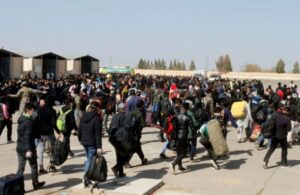GHAZNI CITY (SW) – In Ghazni province, many girls who have been excluded from formal education are turning to carpet weaving as a means to escape unemployment and the psychological pressures associated with it.
Sharifa, a former student in Ghazni, shared that after schools were closed, she turned to carpet weaving to combat depression and earn a livelihood. She said: “After the schools were closed, I was idle at home for some time. Now, I have started weaving carpets. I have learned the craft and it keeps me busy, plus I earn around 2,000 to 3,000 afghanis a month.”
Madina, another former student in the province, also said that she began carpet weaving to improve her family’s financial situation. “Since the courses and schools were shut down, I took up carpet weaving. In a situation where I can’t continue my studies, carpet weaving is both a distraction and a way to contribute to my family’s economy.”
Similarly, Khatema, another student engaged in carpet weaving at a workshop in Ghazni, explained: “If schools reopen, we will go back. Carpet weaving is good, but it’s very hard work. Without focus, it can be quite challenging.”
On the other hand, Hussain Dad Rezaie, owner of a carpet weaving workshop in Ghazni, noted that over the past three years, many women and girls in the province have taken up carpet weaving. However, he voiced dissatisfaction with the lack of a market for their products, saying: “Carpets are sold very little domestically—perhaps only 3%. The situation is not good for exports either, and the industry is facing a downturn.”
Ahmad Shah Lali, General Director of Industrial Parks at the Directorate of Industry and Commerce in Ghazni, mentioned efforts to support artisans and market their products. “We organized a major exhibition called the Treasure of Afghanistan for three days to showcase carpets and other products from the province, aiming to boost the carpet industry in Ghazni,” he said.
Following the closure of schools for students above the sixth grade, many students in Kabul, Takhar, Kunduz, Badakhshan, Jowzjan, and Herat have turned to learning skills in tailoring, embroidery, and carpet weaving.






